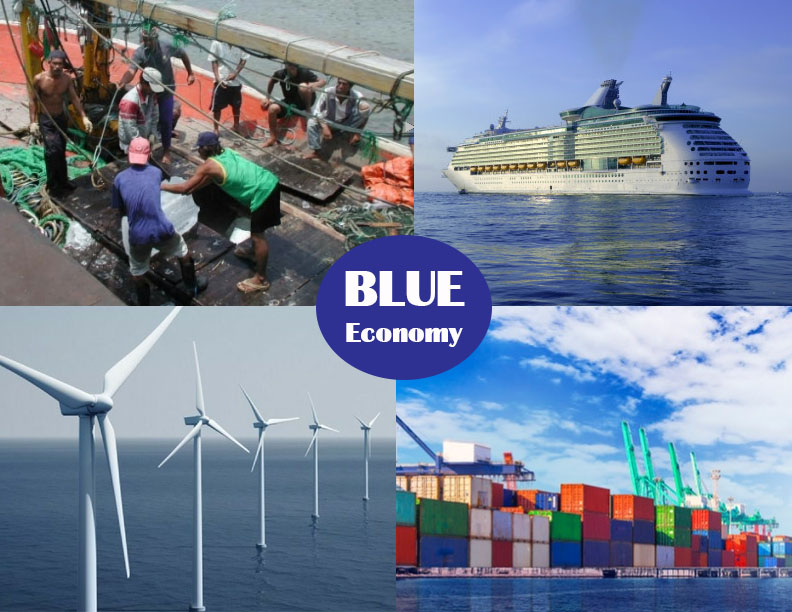New GEF-funded Multi-country Blue Economy Initiative gets underway in the Caribbean

BELIZE CITY, 4 MARCH 2020 (CRFM)—A new US$46 million initiative to promote Blue Economic priorities in the Caribbean, in support of the sustainable use and conservation of the region’s vast and diverse marine ecosystems and resources, gets underway with a two-day inception workshop on 5-6 March at the Best Western Plus Belize Biltmore Plaza Hotel in Belize City.
Marine ecosystems account for over 80 percent of CARICOM States and territories, supporting not just fisheries, but also tourism, ocean transportation, energy, and other economic pillars. They are also critical to the sustainable livelihoods of coastal communities and food security for markets even beyond their borders. Despite threats that confront the region—not the least of which are climate change, ocean acidification, marine pollution and irresponsible fishing—the Blue Economy model still holds great promise.
The current initiative, entitled “Blue Economy (BE): Caribbean Large Marine Ecosystem Plus (CLME+): Promoting National Blue Economy Priorities through Marine Spatial Planning in the Caribbean Large Marine Ecosystem Plus,” is a 4-year project funded by the Global Environment Facility (GEF) with a grant of US$6.2 million and co-financing of US$40.1 million. The Development Bank of Latin America (CAF) will be the lead implementing agency while FAO will be a co-implementing agency. The Caribbean Regional Fisheries Mechanism (CRFM) will be the project executing agency. The GEF-funded “BE-CLME+ Project” will promote blue economy development in the Caribbean region through marine spatial planning and marine protected areas, the ecosystem approach to fisheries, and development of sustainable fisheries value chains.
The expected results of the project include focused climate-smart investments into national and regional marine spatial planning (MSP) efforts that inform development and implementation of national blue economy strategies. The multi-country project will also focus on extending or strengthening marine protected areas to preserve marine ecosystems and ensure sustainable livelihoods to coastal and fishery communities. The project is also expected to result in the establishment of a regional MSP for ecosystem-based fisheries, inclusive sustainable fisheries value chains, and new or expanded marine protected areas in at least five Caribbean countries. It will also support improvements in knowledge management, monitoring and evaluation, based upon knowledge and experiences from the project and experiences with climate-resilient blue economies from other regions and other Global Environment Facility (GEF) International Waters projects, in partnership with IW: LEARN (the GEF’s International Waters Learning Exchange and Resource Network).
The Inception Workshop, to be held on 5-6 March, will be attended by representatives of the six participating countries: Barbados, Belize, Guyana, Jamaica, Panama and Saint Lucia, as well as partner agencies, including the Food and Agriculture Organization of the United Nations and the Development Bank of Latin America, SICA/OSPESCA, UWI-CERMES, JICA, UNDP-GEF CLME+ Project and the Caribbean Network of Fisherfolk Organisation (CNFO). Officials from the CRFM, CAF, FAO/WECAFC and the Belize Ministry of Fisheries, Forestry, the Environment and Sustainable Development will address participants at the opening ceremony, to be convened at 9:00 a.m. on 5 March.
It is expected that at the conclusion of the workshop, the participating States and partners will have agreed on the main activities, milestones and timeline to develop the detailed project document and workplan for submission to the GEF for consideration by November 2020.
CRFM social media links:
You Tube: http://www.youtube.com/user/TheCRFM
Facebook: http://www.facebook.com/CarFisheries and
Twitter: https://twitter.com/CaribFisheries
ABOUT THE CRFM:
The Caribbean Regional Fisheries Mechanism (CRFM) was officially inaugurated on 27 March 2003 in Belize City, Belize, where it is headquartered, following the signing of the “Agreement Establishing the CRFM” on February 4, 2002. It is an inter-governmental organization whose mission is “to promote and facilitate the responsible utilization of the region’s fisheries and other aquatic resources for the economic and social benefits of the current and future population of the region.”





